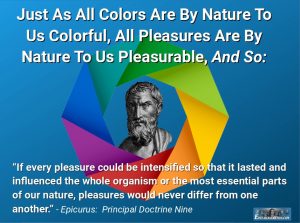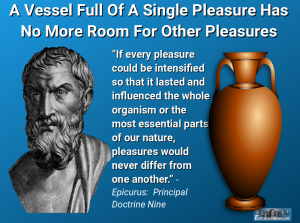Visualizing Principal Doctrine Nine – “”If every pleasure could be intensified…”
This doctrine is one of the more difficult sayings, because the context is not as clear as many of the others. In my view, the point of this one relates to the material discussed in DeWitt’s “Fullness of Pleasure” discussion, and has at least these two major points:
(1) All pleasures share in the same unifying character – they are pleasurable because our feeling of Pleasure tells us so. There is no outside standard or worthiness or nobility or good or bad, and no need for evaluation by logic or reason. We know a thing is pleasurable (or painful) because our Feelings tell us so. This is of course important because we need to eliminate once and for all the viewpoint that there is something floating in the universe, in the nature of a supernatural god, or a Platonic ideal form, or an Aristotelian essence, that defines for us what pleasure is. Pleasure and pain are understood by us through the Feelings, and through the Feelings alone.
(2) In addition to the main point, it seems to me that this doctrine also calls to mind the context that the individual human experience is limited, as illustrated in the analogy of the vessel or jar. Once full, the vessel can hold no more, and one full vessel is essentially the same as any other full vessel. Of course the question will be asked whether all full vessels are the same if they vary in content. Within the context in which we are speaking, that of all pleasure being “good” because it is pleasurable, all full vessels are the same.
Many challenging questions follow from these observations. One of the most challenging would be something like: “So you are saying that the person who spends a lifetime digging worms, because it is pleasurable to him, is to be rated the same as a person who spends his life studying science and making the world a better, healthier place for generations to come?
The point we have to keep coming back to is that there is no supernatural god or ideal forms or “virtue” that answer this question for us. Many people want to think that their god or their morality justifies their view of ranking some lives as “worthy” or “unworthy.”
That is the point which has to sink in by stating these issues in extremes, as Epicurus is doing. No god, no set of ideal forms, no single list of “virtue” validate our choice of how to live. In reality, there is only Nature, and Nature gives us only pleasure and pain by which to decide how to live. We can answer whether a life of devoted to science is “better” than a life devoted to digging worms only by looking at the outcome, and calculating which of the two is likely to lead to the most pleasurable life.
————————–
Discussion for this topic can be found here. More graphics for Principal Doctrine 9 can be found here.



